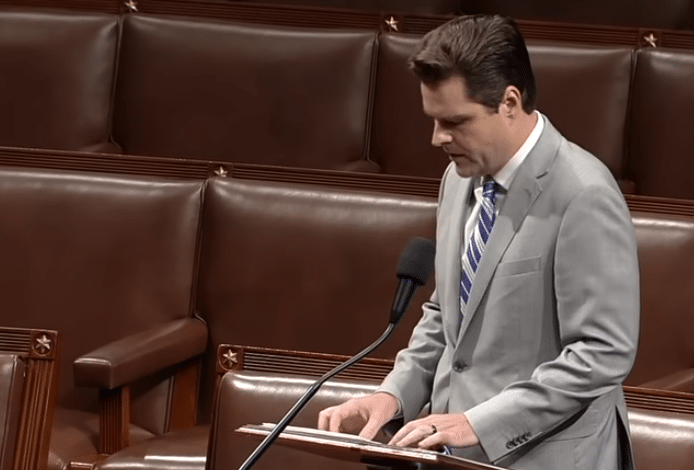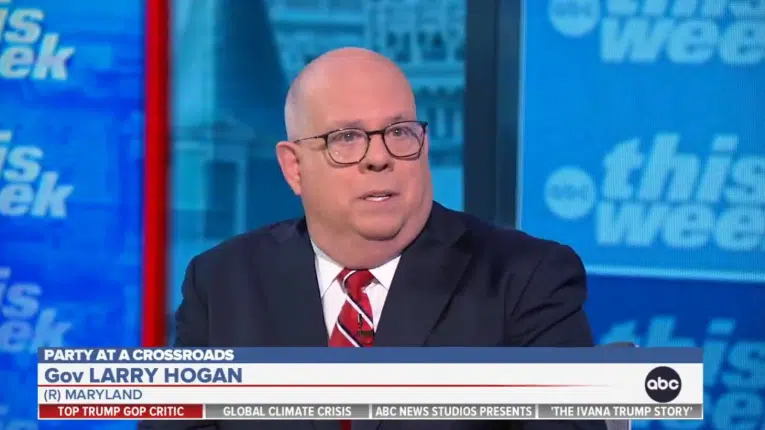Towards the end of an X (formerly Twitter) Space on Dec. 10 hosted by Mario Nawfal featuring Elon Musk reinstating Alex Jones’ X.com account after five years of being censored and deplatformed, U.S. Rep. Matt Gaetz (R-Fla.) was asked what Congress is doing to rein in the censorship by federal agencies including the Cybersecurity and Infrastructure Security Agency (CISA) and the Federal Bureau of Investigation’s (FBI) Foreign Influence Task Force.
In the X Space with Elon Musk and Alex Jones, Gaetz stated, “Republicans in the House should be taking a stronger stand. In my view, we should be putting riders on the funding for CISA and FBI so that anything that would occur there would be so clearly outside the law that it would draw sanction, but instead we continue to govern by these continuing resolutions that don’t gate resources away from that censorship.”
Defunding the censorship is definitely a very good idea. And the question posed to Gaetz about what Congress is actually doing about this is a very good question, especially since Gaetz on Nov. 15 voted to block one of the pieces of legislation that addresses this directly from coming to the floor for a vote, H.R. 5893, the Commerce, Science and Justice appropriations bill that is currently languishing on the floor of the House of Representatives.
Several members have stated that the Commerce, Science and Justice bill did not go far enough to stop the weaponization of the federal government and Justice Department including the censorship by government agencies partnering with social media companies to remove what government calls misinformation, disinformation and malinformation (MDM), but also political and mass surveillance by the Justice Department and the politicized prosecutions of former President Donald Trump that intend to attempt to get Trump removed from the presidential ballot in 2024.
However, the Commerce, Science and Justice appropriations bill contains Section 597, which states very clearly “None of the funds appropriated or otherwise made available by this Act may be made used to… classify or facilitate the classification of any communications by a United States person as misinformation, disinformation, or malinformation; or … partner with or fund nonprofit or other organizations that pressure or recommend private companies to censor lawful and constitutionally protected speech of United States persons, including recommending the censoring or removal of content on social media platforms.”
Is that provision perfect? Far from it, but it is still definitely more than is currently on the books under current law and defunds the entire Department of Justice’s MDM programs, and would further prohibit the Justice Department form partnering with or funding or outsourcing the censorship to private nonprofit and other institutions.
But this is not the only appropriations bill that is suffering from certain Republicans’ inability or unwillingness to vote for them, not just Gaetz. There is also the Department of Homeland Security Appropriations Bill, H.R. 4367, which also contains provisions that would directly defund the censorship.
The Homeland Security appropriations bill also contains language that would defund the censorship, Section 540, which states, “None of the funds appropriated or other4 wise made available by this Act may be made available to establish or support the activities of … a Disinformation Governance Board at the Department of Homeland Security, or any other entity carrying out similar activities relating to mis-, dis-, or mal-information in a similar manner or to a similar extent to such a Board; or … any entity responsible, directly or indirectly, under color of countering mis-, dis-, or mal-information or otherwise, for instructing, influencing, directing, or recommending that private companies censor, prohibit, or obstruct lawful and constitutionally protected speech of United States persons on social media platforms, including by … terminating speakers’ accounts; … temporarily suspending accounts; … imposing warnings or strikes against accounts to stop future speech; … ‘shadowbanning’ speakers; … demonetizing content or speakers; … adjusting algorithms to suppress or deemphasize speakers or messages; … deboosting speakers or content; … promoting or demoting content; … placing warning labels or explanatory notes on content; … suppressing content in other users’ feeds; … promoting negative comments on disfavored content; … requiring additional click-through(s) to access content; or … any other such methods.”
To be fair, Gaetz did vote to allow the Homeland Security bill to come to the floor on Sept. 26 — the resolution also moved the Defense, Agriculture and State appropriations bills to the floor — prior to his moving to successfully depose former House Speaker Kevin McCarthy (R-Calif.) for putting in a continuing resolution when agreement could not be reached on these separate appropriations bills with the Senate.
After that, the House had to spend several weeks choosing a new Speaker, now House Speaker Mike Johnson (R-La.), and since then House Republicans have been shedding members, with the House voting to expel former U.S. Rep. George Santos (R-N.Y.) and now former Speaker McCarthy will be leaving Congress in January. Both seats will go to special elections.
Once Speaker Johnson was in place, the failure of the Commerce, Science and Justice appropriations bill, which, again, defunds the censorship at the Justice Department including the FBI and that Gaetz voted against, has derailed the entire appropriations process as the House opted for a continuing resolution until the end of Jan. 2024 instead.
Now, despite the push for new House leadership, and getting it, the same exact objections to the funding bills are coming to the fore, even though they deal with things like the censorship but also defund other items like government-based retirement savings incentives and subsidies for Environmental, Social and Governance (ESG) and Diversity, Equity and Inclusion (DEI) investments via Department of Labor regulations and the Thrift Savings Plan federal employee retirement plan, as well as Securities and Exchange Commission’s climate disclosure rule that would compel publicly traded companies to disclose their carbon emissions and give the federal government the power to effectively issue carbon scores on America’s corporations.
When Elon Musk made his bid to buy Twitter (now X) in 2022, he took on the S of ESG: Social, by addressing Twitter’s terms of service. Over the years, Twitter has pursued aggressive Diversity & Inclusion goals that internally impact racial and gender hiring quotas — which run afoul of federal civil rights law — and diversity sensitivity training at the company, and which outwardly enforces corporate censorship policies on the public under the guise of terms of service, especially to anyone who dissents against these goals.
In 2020, Twitter’s ESG report declared that it would not “amplify” the speech of some on their platform: “Freedom of speech is a fundamental human right — but freedom to have that speech amplified by Twitter is not. Our rules exist to promote healthy conversations.” Also, “We aim to strike an appropriate balance between empowering freedom of expression and creating a safe service for participatory, public conversation.”
In other words, some users on Orwellian Twitter were more equal than others.
Instead, Musk succeeded in buying Twitter and has sought to make it a free speech platform because he says it is essential to functioning democracies to have open platforms. Since that time, he has reinstated the accounts of controversial figures like Alex Jones, but also former President Donald Trump.
Now, finally, there is House legislation that, taken together, deals with the government and corporate censorship, including the House Homeland Security funding bill, the Labor and Health and Human Services funding bill, the Commerce, Science and Justice funding bill and the Financial Services funding bill.
Are they perfect? No, but they do far more than current law, and they definitely meet Gaetz’ stated criteria of “putting riders on the funding… so that anything that would occur there would be so clearly outside the law that it would draw sanction…”
In fact, when one goes through this year’s House appropriations bills being offered by the GOP majority, one finds the most comprehensive effort ever in Congressional history to deny funding to overreaching government regulations and policies. And not just via amendments offered on the floor of the House, but in those offered by the committees themselves, which have already put these very important provisions including defunding the censorship into the underlying legislation so that they wouldn’t die on the floor in contentious votes.
So, it’s not even a situation where conservatives would have to fight on the floor to get the censorship or the DEI defunded, in these cases, all members would have to do is vote for the bills that are already there. But they’re never good enough.
Making matters even more difficult for themselves, House Republicans have explicitly removed from any consideration the possibility of any consolidated appropriations bills coming up this fiscal year or next, which could also be used to insert policy riders onto. And several members like Gaetz have also stated they will not vote for continuing resolutions either, even when they contain policy riders like H.R. 2 border security legislation, which 21 House Republicans including Gaetz rejected on Sept. 29, setting off the 2023 House Speaker crisis.
I personally hope that, despite these difficulties to date, that House leaders and conservatives including Gaetz will find a way to pass the appropriations bills currently under consideration and then work with the Senate to get as many of these policy riders, including and especially those defunding the censorship and ESG and DEI that also drives the censorship on social media, into the final bills as possible.
But, it is possible, indeed, highly likely that one of the costs of the 2023 battle over appropriations and who was to be the House Speaker will be that none of the provisions ending the censorship will pass. Why?
If House Republicans cannot vote for omnibus bills that contain policy riders that reduce government regulations and policies, and they cannot vote for continuing resolutions that would try to do the same, and they defeat individual spending bills that might defund the censorship, what can and will possibly be accomplished via Congress’ Article I power of the purse this year? Nothing.
Given the House GOP’s meager majority, it is all but certain that the censorship cannot and will not be defunded via these appropriations bills unless Gaetz and other members vote for them. Can they get to yes? Time and perhaps the American people will tell.
At a certain point, every man for himself is no principle at all.
Robert Romano is the Vice President of Public Policy at Americans for Limited Government.








